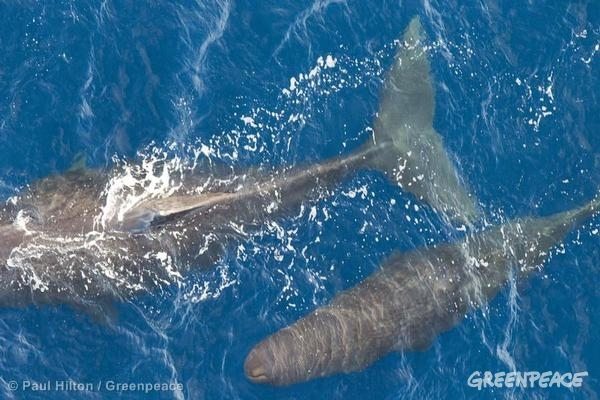Whale conservation has lost out to the fading, but still defiant pro-whaling forces, at this year’s International Whaling Commission (IWC) annual meeting. The meeting in Panama City had initially offered the world hope that the IWC would actually help to save whales, not whalers, after the Latin American nations proposed the creation of a whale sanctuary in the southern Atlantic.
Blogpost by Junichi Sato, Executive Director of Greenpeace Japan
Not to be out-muscled, however, Japan’s whaling lobby has shamefully continued to hold back meaningful progress for whales globally despite the fact its industry is barely surviving at home.
It’s been a rough few years for the whaling industry here in Japan. Markets are shrinking and whale meat is going unsold at auctions – sometimes no one even bids for it. The industry is sinking into debt and demanding bailouts from the government; it only managed to survive last year thanks to a last-minute cash injection from the government. Diverted from the third supplementary budget to deal with the fallout from the March 2011 tsunami and nuclear disaster, the 2 billion yen was allocated to “contribute to the recovery of Ishinomaki City”.
The excuse given was that a few crewmembers of the annual Antarctic expeditions lived near Ishinomaki – and therefore the community was benefiting from their employment. The truth is that the taxpayer funds were mostly used to pay off whaling industry debt. It was an immoral and reprehensible diversion of funds away from communities that desperately needed support (many of which still do), at a critical time, and justifiably led to national and international outrage.
Thankfully, there is little chance the industry can get away with another wasteful stunt like that. There’s no emergency budget it can leech off, no public outcry for it to be supported, and the government is now pushing tax hikes to deal with ballooning national debt. It would be unfathomably foolish for Prime Minister Yoshihiko Noda to go out on even shakier ground to increase the already large public subsidies the whaling industry receives.
Greenpeace, along with other Japanese NGOs, has been focusing on the market side of whaling in Japan for many years, trying to undermine political and public support for the industry. What we have seen is a pattern of dwindling consumption that culminated in this month’s news that of the 1,200 tons of whale meat the industry brought to market after last summer’s hunt, 75% remained unsold.
Not only was the bulk of the meat from the hunt left unsold, much of it did not even receive a bid despite being listed at around 50% discount.
Japanese people are not interested in eating whale meat anymore. As civil dissent becomes more common in Japan following the tsunami and nuclear disaster, the Japanese public is increasingly being exposed to more conservation-related points of view.
The damning and popular 2010 documentary The Cove, which focused on dolphin hunting, was finally released in Japan and proved quite popular, despite a protest by a handful of angry nationalists. Soon a subtitled version of Big Miracle, a film about the rescue of grey whales trapped in ice, will also be shown. This too could help reduce demand further and bring the industry another step towards its inevitable end. Five years ago it would have been unthinkable for either of these films to be shown here, let alone in major cinemas.
The bell is truly tolling for Japan’s commercial whaling industry. It’s only been clinging to life by sinking its dirty claws into the public purse. But times are tough for Japan, and the public – angry and disillusioned with a government that continues to ignore them – are finally standing up in great numbers against recklessness of officials, against waste, and against corruption.
I hope we have seen the last whaling expedition to the Antarctic. With science, finance, and public opinion all against this reckless hunt, it is hard to see how it can continue.



